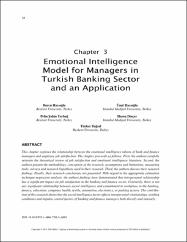| dc.contributor.author | Hacıoğlu, Burcu | |
| dc.contributor.author | Hacıoğlu, Ümit | |
| dc.contributor.author | Yarbağ, Pelin Şahin | |
| dc.contributor.author | Dinçer, Hasan | |
| dc.contributor.author | Tuğsal, Türker | |
| dc.date.accessioned | 10.07.201910:49:13 | |
| dc.date.accessioned | 2019-07-10T19:38:19Z | |
| dc.date.available | 10.07.201910:49:14 | |
| dc.date.available | 2019-07-10T19:38:19Z | |
| dc.date.issued | 2015 | en_US |
| dc.identifier.citation | Hacıoğlu B., Hacıoğlu, Ü., Yarbağ, P. Ş., Dinçer, H. ve Tuğsal, T. (2015). Emotional intelligence model for managers in Turkish banking sector and an application. Handbook of Research on Strategic Developments and Regulatory Practice in Global Finance içinde (34-35. ss.). https://dx.doi.org/10.4018/978-1-4666-7288-8.ch003 | en_US |
| dc.identifier.isbn | 9781466672901 | |
| dc.identifier.isbn | 1466672889 | en_US |
| dc.identifier.isbn | 9781466672895 | en_US |
| dc.identifier.uri | https://hdl.handle.net/20.500.12511/1575 | |
| dc.identifier.uri | https://dx.doi.org/10.4018/978-1-4666-7288-8.ch003 | |
| dc.description.abstract | This chapter explores the relationship between the emotional intelligence talents of bank and finance managers and employee job satisfaction. The chapter proceeds as follows: First, the authors carefully reiterate the theoretical review of job satisfaction and emotional intelligence literature. Second, the authors present the methodology, conception of the research, assumptions and limitations, measuring tools, surveys and research hypothesis used in their research. Third, the authors discuss their research findings. Finally, their research conclusions are presented. With regard to the appropriate estimation technique-regression analysis, the authors findings have demonstrated that interpersonal relationship has a significant impact on job satisfaction in the banking and finance sector. Contrarily, there is not any significant relationship between social intelligence and commitment to workplace in the banking, finance, education, computer, health, textile, automotive, electronics, or packing sectors. The contribution of this research shows that the social intelligence factor affects interpersonal relationships, working conditions and impulse control factors of banking and finance managers both directly and intensely. | en_US |
| dc.language.iso | eng | en_US |
| dc.publisher | IGI Global | en_US |
| dc.rights | info:eu-repo/semantics/openAccess | en_US |
| dc.subject | Emotional | en_US |
| dc.subject | Intelligence | en_US |
| dc.subject | Managers | en_US |
| dc.title | Emotional intelligence model for managers in Turkish banking sector and an application | en_US |
| dc.type | bookPart | en_US |
| dc.relation.ispartof | Handbook of Research on Strategic Developments and Regulatory Practice in Global Finance | en_US |
| dc.department | İstanbul Medipol Üniversitesi, İşletme ve Yönetim Bilimleri Fakültesi, İşletme Bölümü | en_US |
| dc.authorid | 0000-0002-0068-0048 | en_US |
| dc.authorid | 0000-0002-8072-031X | en_US |
| dc.identifier.startpage | 34 | en_US |
| dc.identifier.endpage | 35 | en_US |
| dc.relation.publicationcategory | Kitap Bölümü - Uluslararası | en_US |
| dc.identifier.doi | 10.4018/978-1-4666-7288-8.ch003 | en_US |


















